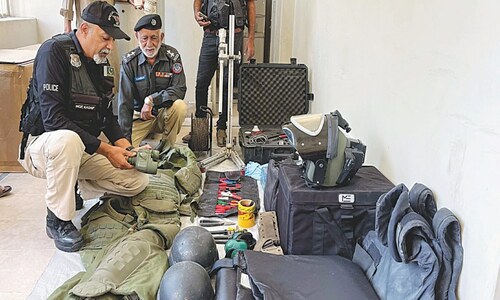KARACHI: Women from all fields of life in Pakistan and South Asia collected at a planning and consultative session on Wednesday for the forthcoming Women of the World (WOW) festival that celebrates the achievements of women and girls while looking at obstacles faced by them across the world.
On the sidelines of the planning, the British Council arranged for some notable women to speak up their minds and educate others on women in their countries.
Nasim Firdaus, executive director of the Bangladesh Alliance for Women Leadership, said that political movement in Bangladesh merged with the women’s movement there. “Just as Bangladesh moved towards liberty, its women, too, wanted freedom and liberty. The women’s movement in Bangladesh is now vibrant with 1,500 registered NGOs and thousands more, which are unregistered. We are trying for equal rights as our men but still have a long way to go,” the guest from Bangladesh shared.
Sapana Pradhan Malla, ex-parliamentarian from Nepal and former legal adviser on violence against women, said that her country was going through a transition where the women also wanted to get their voices heard. “The laws in Nepal were such that they just couldn’t allow women to come forward. It was more a religious thing as we would be reminded that Nepal was a Hindu state where women were not expected to do much other than obey their husbands.
“But the insurgency in Nepal created an opportunity for power for women. After much struggle we managed to get the inheritance law for women changed. We fought for a non-religious constitution. Now we have a constitution framework that does not discriminate. We also have a woman president and woman speaker. And soon we will also have a woman chief justice,” the guest from Nepal said.
Joining in through Skype, Bishaka Sen, teacher and trainer from Kolkata, India, said that education was the key to empowerment of women. “But the kind of education imparted also plays a major role. Maybe a child has worked all day to fall asleep during class, maybe a student is coming to school after witnessing her parents fighting. We have to take all this into account and learn to take a holistic approach when thinking education. That’s how we can help girl students to gain confidence to think and question,” pointed out the guest from India.
Ruwanthie de Chickera, a theatre director from Sri Lanka, also joining in via Skype, said that due to internal war in her country, the progress of women was pulled back. “For a while all they desired was to feel secure by getting the support of a man,” she said.
Dr Sahraa Karimi, a film director from Afghanistan with a PhD in cinema, explained that having spent her growing years in the Czech Republic and knowing how life could be outside Afghanistan she could observe the plight of Afghan women even better than they could as they had not really experienced anything different themselves. “Afghan women may be rich or they may be poor. It makes no difference. All lead a painful and sad existence,” she said.
“Only through international agencies and NGOs can we highlight our plight and raise our voice, which is also very important. Right now Afghan women have to help themselves by making their troubles known to the world. No one can help us if we don’t help ourselves,” she pointed out.
Meanwhile, Dr Quratulain Bakhteari shared her surprise of being called to Balochistan to mobilise the communities there to educate their children. “I was working in Karachi with the Orangi Pilot Project but I left all that to help in Balochistan when asked to do so. But once there I was surprised to find ministers and people in power, who had called me there themselves, felt that I should concentrate on boys’ education,” she said.
“I also found girls with ‘A’ grades in matriculate wasting their time at home doing nothing. There were no girls’ schools there so I wondered where they got their education from. It was then that it was explained to me by their elders that they had home-schooled them. The girls only appeared for their board exams. But when I asked why there was no data with their mention in the board records, the elders informed that they had made them appear for the exams under boys’ names,” said Dr Bakhteari.
“Those girls could prove to be good teachers at girls schools. Between 1992 and 1997, I established 2,200 schools in Balochistan. The girls after getting their basic education there were brought to Karachi for further education. And here they felt liberated and confident to return to their province in order to help out others there,” she said.
“Frankly, education and credentials can do nothing to empower women here. We come across women who are doctors and engineers, who fit the image of the soft, docile and passive woman. Their credentials are good for just getting them marriage proposals. The mother and parenting plays a big role here,” she pointed out.
Now in its fifth year, the WOW festival is planned to be held in Karachi sometime in April, according to its artistic director Jude Kelly. “There’s an arts programme, and a whole range of talks and debates on topics ranging from fashion and feminism, politics, quotas for women, domestic violence, race, sex, nutrition,” she said.
Published in Dawn, January 14th, 2016














































Dear visitor, the comments section is undergoing an overhaul and will return soon.